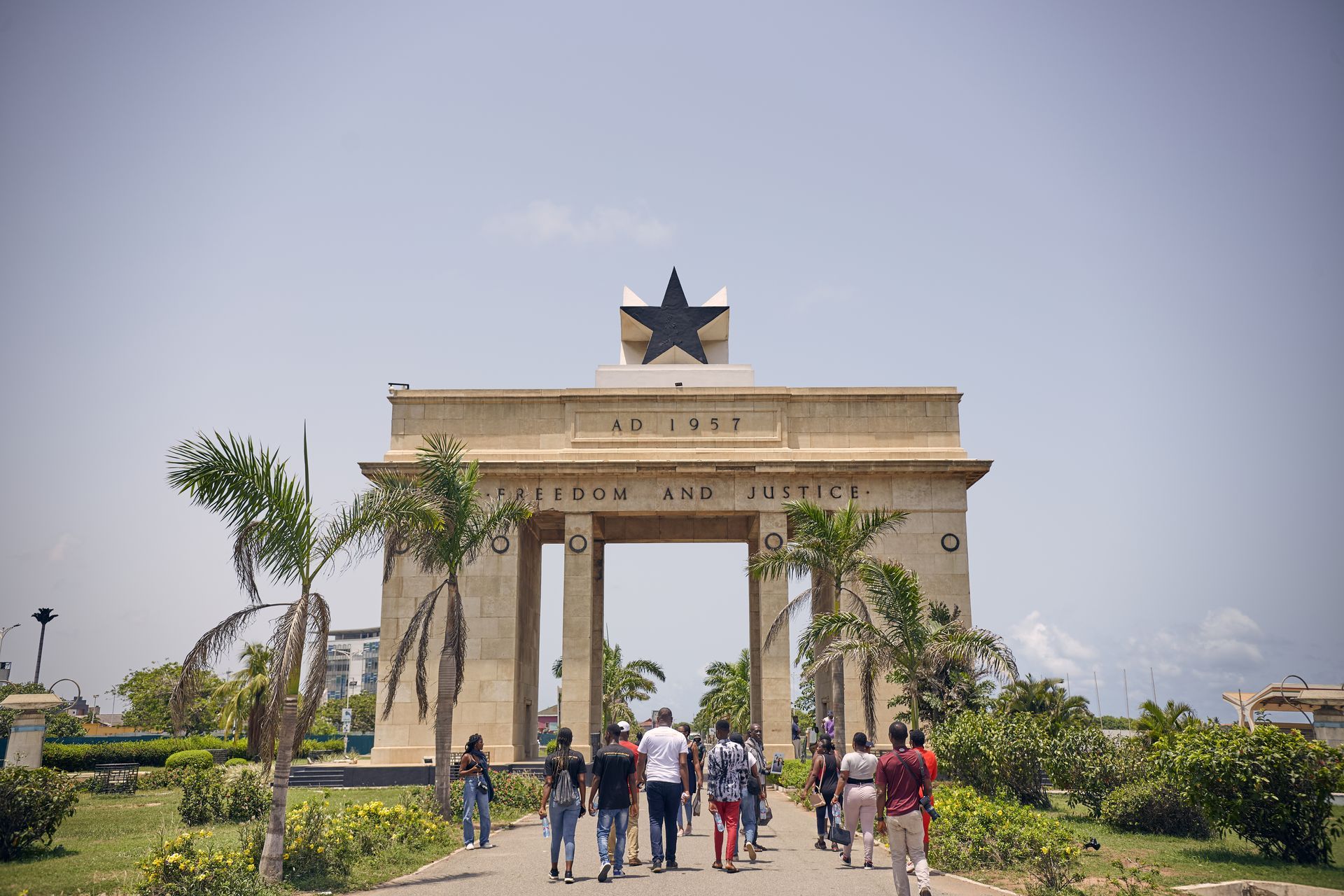
About Ghana
Discover the vibrant culture, rich history, and diverse landscapes of Ghana, West Africa's golden gem

About Ghana
Ghana, formally the Republic of Ghana, is in West Africa. It borders the Ivory Coast to the west, Burkina Faso to the north, and Togo to the east, with the Gulf of Guinea and the Atlantic Ocean to the south. It covers 238,540 km² with a 539 km coastline. Over half (59%) of its 32 million residents live in cities, such as Accra (the capital), Kumasi, Tamale, and Sekondi-Takoradi. Ghana's diverse biomes include tropical rainforests and coastal savannas.
Historically, Ghana was home to powerful empires, including the Ghana Empire (4th-11th centuries), involved in gold and salt trade. During the 15th-19th centuries, it was central to the transatlantic slave trade. British colonial rule began in the 19th century, and Ghana gained independence in 1957, led by Kwame Nkrumah. Post-independence, Ghana transitioned to a stable democracy in 1992.
Economically, Ghana has diversified from agriculture to include mining (gold, bauxite), oil production, and services. It is a member of the African Union and the United Nations and participates in peacekeeping missions. The Ghanaian flag, adopted in 1957, has red, yellow, and green stripes with a black star, symbolizing independence and unity.
Ghana's population, from a 2021 census, was 30,832,019. The country has a youthful population, majorly practicing Christianity and Islam. English is the official language, with over 80 other languages spoken, including Akan and Dagbani.
The Ghanaian Cedi (GHS) is the currency, issued by the Bank of Ghana. Cultural highlights include traditional clothing like Kente cloth, music, dance, and cuisine such as banku and fufu. Ghana's natural and human resources include gold, cocoa, and rich agriculture, making it a key player in Africa's economy and tourism.
For international visitors, key information includes visa requirements, health precautions, and transportation options. The best time to visit is during the dry season (November to April).
Ghana has a tropical climate with wet (April-October) and dry (November-March) seasons, and an average annual temperature of 28°C (82°F). It is known for its peaceful democratic transitions, religious tolerance, and cultural richness. Key attractions include Cape Coast Castle, Kakum National Park, and the Ashanti Region.
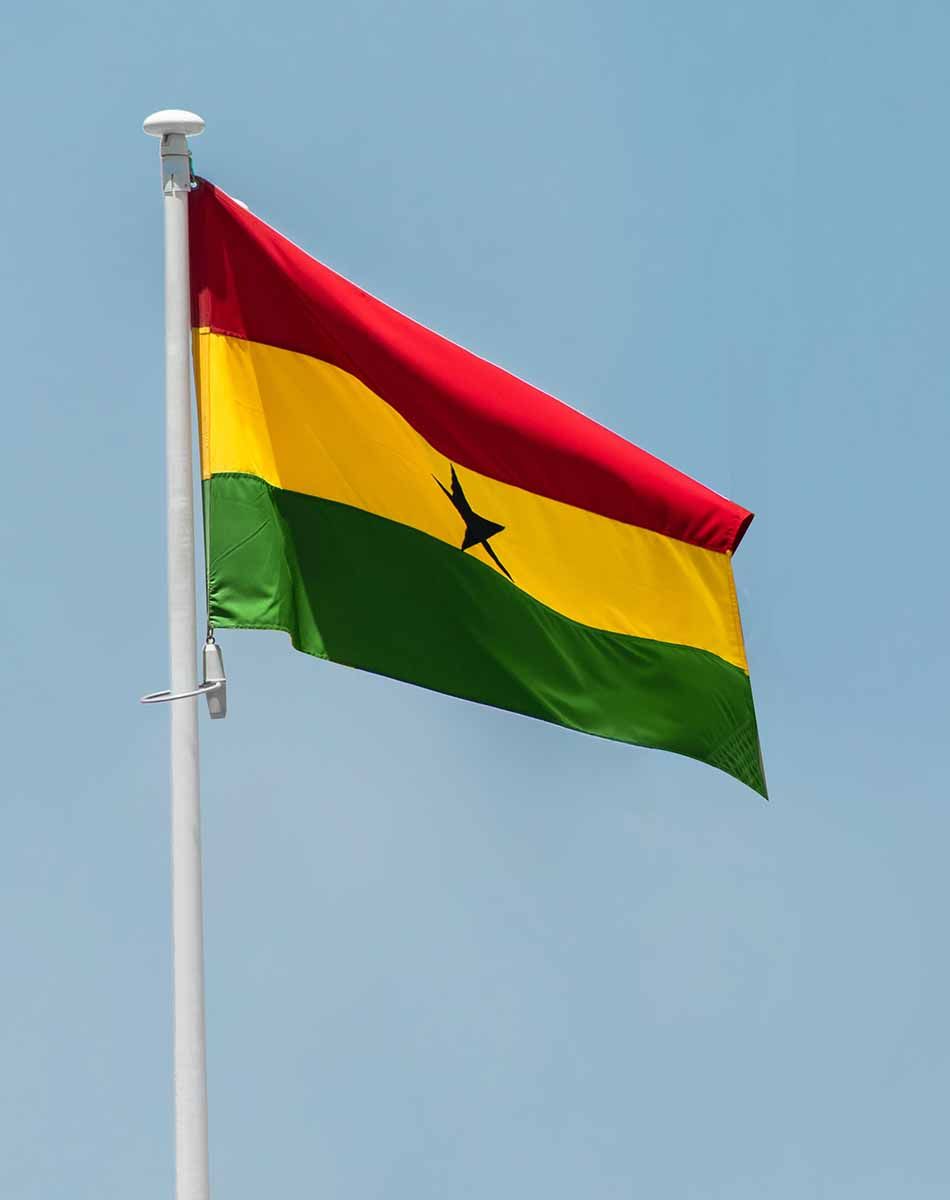
Ghana's Eco-Tourism
Ghana, renowned for its rich cultural heritage and varied landscapes, stands out as a warm haven for eco-tourism, a global movement toward responsible travel and nature conservation. In Ghana, eco-tourism is woven into the fabric of life, where nature and culture coexist harmoniously to offer visitors unique and sustainable experiences.
One outstanding example of eco-tourism in Ghana is Kakum National Park, a beautiful rainforest reserve famous for its magnificent canopy walkway. Suspended above the forest floor, this walkway offers visitors a bird’s-eye view of the thriving ecosystem below. The park’s eco-conscious management ensures that tourism activities have minimal environmental impact, preserving its natural beauty for future generations.
On the other hand, Mole National Park showcases Ghana’s commitment to protecting wildlife habitats. As the largest wildlife sanctuary in the nation, it is home to elephants, antelopes, baboons, and numerous bird species. Eco-tourists can embark on exciting safaris led by park rangers who prioritize environmental protection and animal welfare. Mole National Park’s sustainable practices not only benefit nature but also support the local community by creating jobs and educational opportunities.
Ghana’s coastline along the Gulf of Guinea offers eco-tourists a chance to engage in marine conservation. Communities like Elmina are adopting eco-friendly practices to protect sea turtles and their nesting grounds. Travelers can participate in turtle conservation programs, contributing to the preservation of these endangered species.
Ghana exemplifies how eco-tourism can thrive when nature and culture are both cherished and conserved. By promoting responsible travel, the nation ensures that its natural wonders, such as rainforests and marine life, remain unspoiled for future generations. Eco-tourism enriches the lives of both visitors and hosts, fostering community growth and cross-cultural exchange. As Ghana champions eco-tourism, it invites tourists to embark on sustainable journeys where nature, culture, and conservation intersect to create unforgettable and enriching experiences.
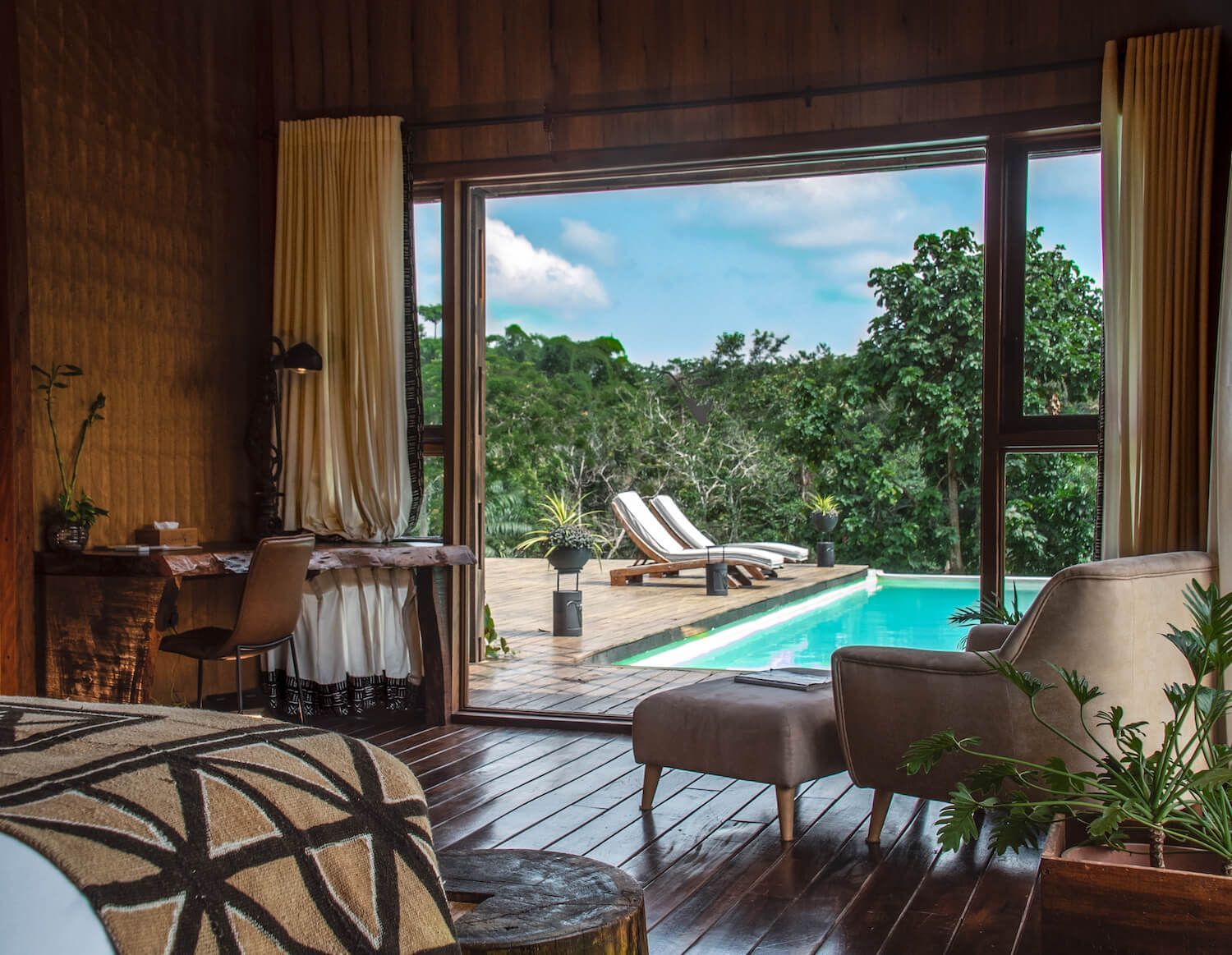
Hotels in Ghana
Ghana offers a wide range of hotels to suit various preferences and budgets for travelers exploring this vibrant West African nation. Hotels are categorized based on the distinctive services they offer. Here are a few types of hotels in Ghana:
Airport Hotels
For travelers arriving in Ghana, Accra's airport hotels provide convenience and comfort. These hotels are located near Kotoka International Airport, ideal for those with early or late flights. Some prominent options include:
- Fiesta Royale Hotel
- Holiday Inn Accra Airport
- Airport View Hotel
- Airport Side Hotel
Luxury Hotels
For those seeking the ultimate in comfort and luxury, Ghana boasts several internationally recognized luxury hotels. These establishments often offer top-notch amenities, including fine dining restaurants, spa and wellness facilities, swimming pools, and impeccable service. Examples include:
• Movenpick Ambassador Hotel, Accra
• Kempinski Hotel Gold Coast City, Accra
• Royal Senchi Resort, Akosombo
Beach Resorts
Ghana’s coastline along the Gulf of Guinea is dotted with wonderful beach resorts that offer a tranquil escape. These resorts typically provide stunning ocean views, water sports, and relaxation opportunities. Examples include:
• Labadi Beach Hotel, Accra
• Coconut Grove Beach Resort, Elmina
Star Ratings
Hotels in Ghana are ranked according to stars, ranging from 1 to 5 stars based on the services they offer, the size of the facility, target markets, number of rooms, ownership and affiliation, and more. Recommendations are typically based on the client’s specific preferences, travel objectives, and budget.
Diverse Hotel Offerings
Ghana’s diverse hotel offerings ensure that there’s something for every type of traveler, whether they seek luxury, adventure, relaxation, or cultural immersion. With a variety of options available, travelers can find the perfect accommodation to match their needs and enhance their experience in this vibrant nation.
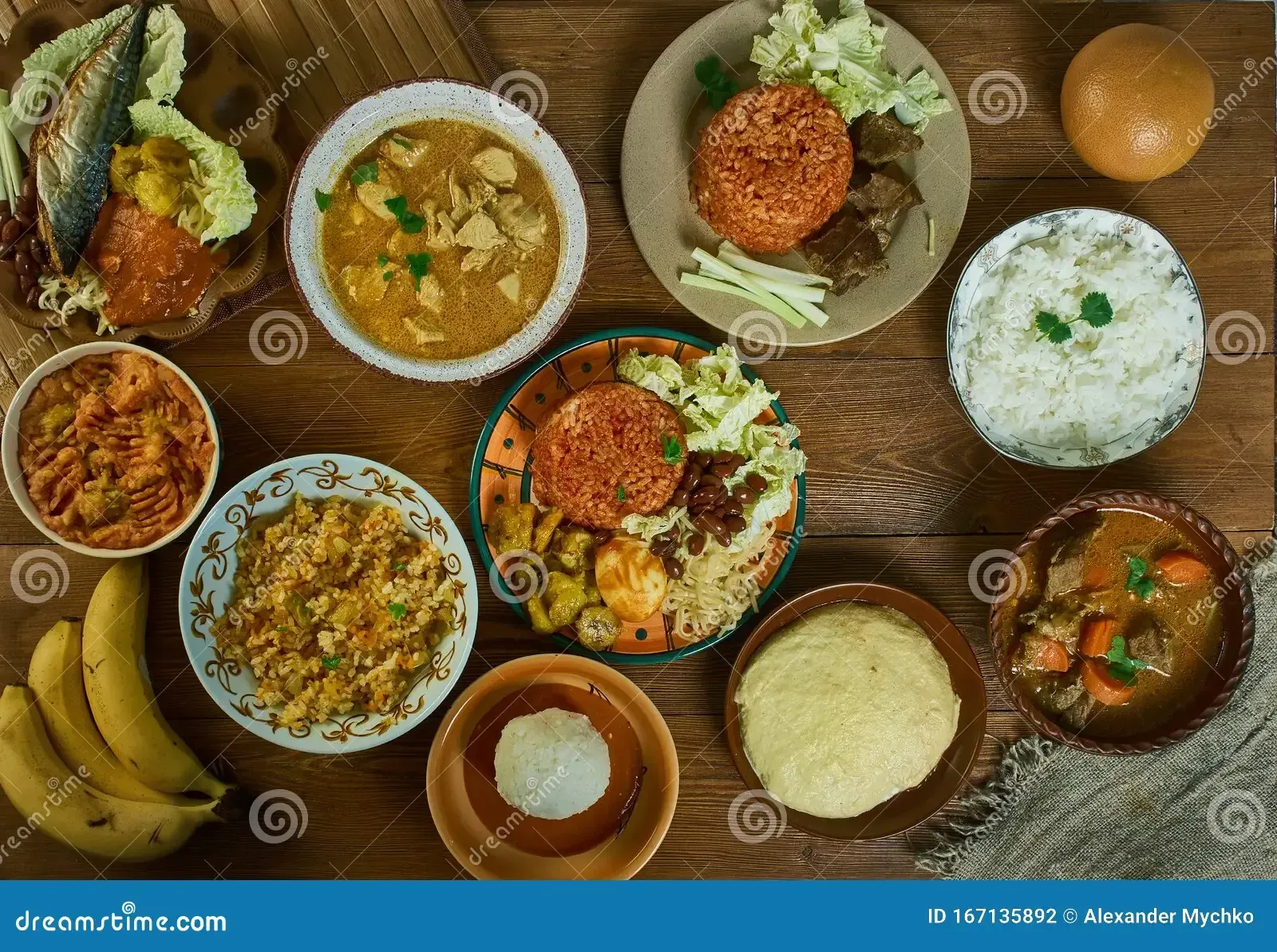
Ghanaian Cuisine
Ghanaian cuisine is renowned for its flavorful and diverse taste, reflecting the country's rich cultural heritage and agricultural abundance. Traditional Ghanaian food combines a variety of ingredients, including staples like cassava, plantains, yams, and maize, with spices and proteins like fish, meat, and legumes. The main dishes are centered around starchy staples, often served with a sauce or soup accompanied by a source of protein. Here are some examples:
Main Dishes
• Fufu: Made from cassava and plantains or yams, pounded into a dough-like consistency. It is typically served with soups such as light soup, groundnut soup, or palm nut soup.
• Banku: A fermented mixture of maize and cassava dough, cooked into a smooth, sour dough. It is often paired with pepper sauce and grilled tilapia.
• TZ (Tuo Zaafi): A dish from northern Ghana made from maize or millet, served with a green leafy soup.
• Kenkey: Fermented maize dough wrapped in corn husks and boiled. It is commonly served with fried fish and spicy pepper sauce.
• Akple: Similar to Banku but made with only maize flour, often served with okra soup.
Soups and Stews
The main ingredients for most Ghanaian soups and stews are tomatoes, hot peppers, and onions. Some popular soups and stews include:
• Light Soup: A tomato-based soup that can be made with fish, goat, or chicken.
• Groundnut Soup: A rich, creamy peanut soup usually served with fufu.
• Palm Nut Soup: Made from the extract of palm nuts, often cooked with meat or fish.
• Red Red: A bean stew made with black-eyed peas cooked in palm oil, often served with fried plantains.
Local Drinks
Ghanaian drinks have a distinct flavor and are an integral part of the culinary experience. Some popular beverages include:
• Asaana: A fermented maize drink, sweet and slightly tangy.
• Palm Wine: A traditional drink made from the sap of palm trees, which ferments quickly and can be distilled into a stronger spirit known as akpeteshie.
• Ice Kenkey: A refreshing drink made from blended kenkey, sugar, and milk, served chilled.
• Bissap (Sorrel): A non-alcoholic drink made from hibiscus leaves, popular in northern Ghana.
• Toose: A spicy, sweetened drink.
• Lamuji: A spicy, sweet drink enjoyed in the north.
• Pito: A traditional alcoholic beverage made from fermented millet, similar to beer.
Every visitor who tries these Ghanaian delicacies would wish to return to the country just for the purpose of food tourism.

Airports
Airports serve as vital gateways for both domestic and international travelers visiting Ghana. Ghana has a number of airports, but the two most well-known are the Kotoka international airport and the domestic airport in Kumasi.
Kotoka International Airport, in particular, is a major hub for international flights and provides essential services to ensure a smooth travel experience for passengers arriving in or departing from Accra.
There are two passenger terminals at the airport: Terminals 2 and 3. Only local flights are served by Terminal 2, while regional, international, and long-haul companies are served by Terminal 3. Currently, Terminal 1 is not in use.
The airport has won the title of “Best Airport in Africa.” Over 450 000 people recently used the airport, making it Ghana’s second busiest airport behind Kotoka International Airport in Accra. Other airports include the Tarkoradi Airport in the Western Region, the Tamale Airport in the Northern Region, the Ho Airport in the Volta Region, the Sunyani Airport in the Bono Region, the Paga Airport/Airstrip servicing the communities of Paga and Navrongo in the Upper East Region of Ghana, and more

Experience Ghana's Vibrant Nightlife
Ghana offers a diverse and lively nightlife scene, especially in major cities like Accra, Kumasi, and Takoradi. From live music and dancing to dining and relaxing evenings, there's something for everyone.
Nightclubs and Bars
Ghana’s cities are home to a wide range of nightclubs and bars, catering to various musical tastes. Popular spots include Carbon Night Club in Accra, Bantama Night Street in Kumasi, the London Bridge in Cape Coast, and the Harbor Area in Takoradi.
Live Music
Ghana has a flourishing live music scene with venues featuring both local and international performers. Enjoy genres like highlife, afrobeats, jazz, and gospel.
Night Markets
Explore Ghana’s night markets to sample traditional fare such as kebabs, grilled fish, fried yam, and waakye. Notable markets include Accra’s Osu Night Market and Kumasi’s Asafo Market.
Karaoke
Karaoke enthusiasts can find numerous spots across Ghana to showcase their singing talents. Many clubs and bars host regular karaoke nights, offering a wide range of music and a lively atmosphere.
Dynamic Nightlife
Ghana’s nightlife varies by day and city, offering a dynamic mix of entertainment for night owls and those seeking to immerse themselves in the vibrant local culture.

December Delight: The Perfect Time to Visit Ghana
December in Ghana offers an unforgettable adventure. Experts agree this is the best time to explore the country’s attractions, thanks to the start of the dry season. Ideal weather makes it perfect for outdoor activities, with sunny, warm days and pleasant evenings for socializing.
Festivals and Celebrations
December is a month of vibrant parties and cultural celebrations. Festivals like the Homowo Festival in Accra and the Dipo Festival in the Krobo region showcase local customs with colorful processions, music, dance, and traditional attire. Christmas in Ghana is uniquely celebrated with a blend of Christian festivities and indigenous practices. Enjoy midnight church services, communal meals, and the lively festive spirit. Hotspots like Osu in Accra and Bantama in Kumasi offer exceptional activities, making year-end celebrations in Ghana truly special.
Experience Ghana's Magic
December is a magical time in Ghana, highlighting the country’s rich cultural heritage, traditions, and natural beauty. Celebrate Christmas in Accra, explore historical sites, and savor local delicacies. The warmth, festivities, and spirit of togetherness make December the best time for a Ghanaian adventure
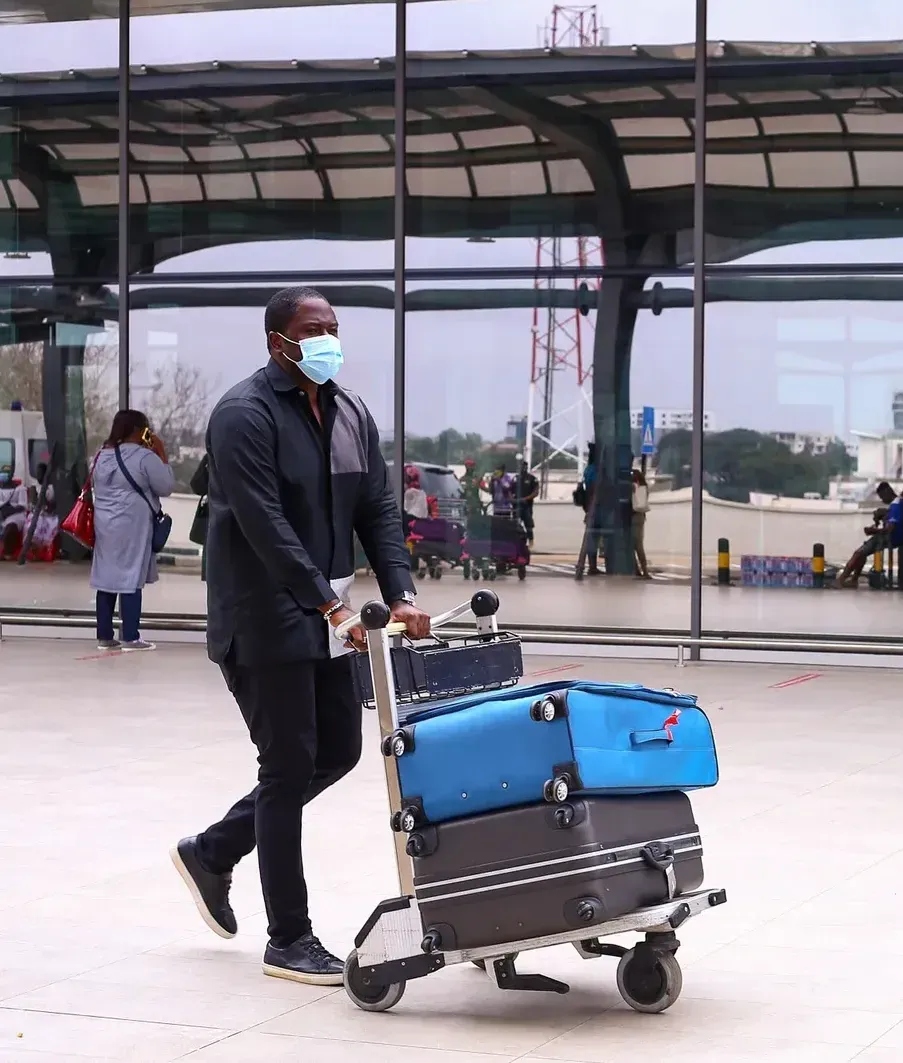
Essential Tips for Traveling to Ghana
Before you pack for your trip to Ghana, consider the climate, culture, and activities you'll be enjoying. Here's a comprehensive checklist to help you prepare:
Travel Documents:
- Passport (with at least six months’ validity)
- Visa (if required)
- Flight tickets and itinerary
- Yellow fever card
- Travel insurance (optional)
Clothing:
- Lightweight and breathable clothing for hot and humid weather
- Modest attire for religious sites and rural areas
- Comfortable walking shoes or sandals
- Swimwear (for beaches or resorts)
- Rain jacket or poncho (during the rainy season)
- Hat or cap for sun protection
- Specific clothing for activities like hiking or safaris
Health and Personal Care:
- Insect repellent
- Sunscreen
- Basic first-aid kit (bandages, antiseptic wipes)
- Prescription medications with copies of prescriptions
- Travel-sized toiletries
- Hand sanitizer and wet wipes
- Travel towel
- Menstrual products (if applicable)
Electronics:
- Universal power adapter (Type D and Type G outlets)
- Voltage converter (if needed)
- Mobile phone and charger
- Camera or smartphone
- Power bank
Money and Security:
- Sufficient cash (Ghanaian Cedi, some U.S. dollars)
- Money belt or neck pouch
- Credit/debit cards and ATM cards
Travel Gear:
- Lightweight backpack or daypack
- Luggage with a secure lock
- Luggage tags with contact information
Miscellaneous:
- Ghanaian SIM card (for local calls and data)
- Phrasebook or language translation app
- Travel pillow and eye mask
- Ziplock bags
- Gifts or souvenirs for hosts or communities
Tips for Packing:
- Check the weather forecast for your travel dates.
- Avoid overpacking; necessities can be bought locally.
- Ghana has shops and markets for additional purchases.
Discover Ghana's Tourism Industry
Ghana's tourism sector has grown significantly, offering rich cultural heritage, historical landmarks, and natural beauty. From ecotourism to outdoor adventures, Ghana welcomes travelers with warm hospitality and diverse accommodations.
Conclusion
Explore Ghana, a culturally diverse and visually stunning destination in West Africa. Whether you're visiting historical sites, embarking on eco-adventures, or engaging with local communities, Ghana promises a captivating and enlightening travel experience.
Come see Ghana for yourself and discover its wonders firsthand.
